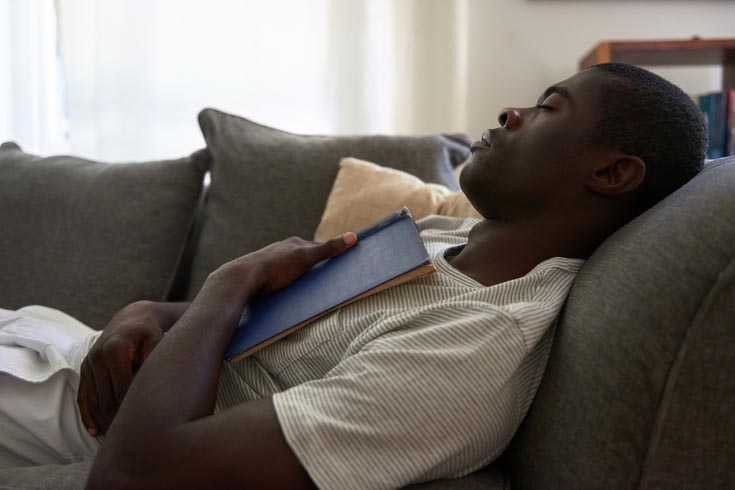Most people sleep on the couch from time to time. Whether you want to escape a snoring partner or watch another episode of your favorite show, you may find yourself unintentionally snoozing on the couch. Though doing so occasionally can be harmless, when it becomes a regular habit, it can lead to less than optimal sleep. However, for some, sleeping on the couch can actually alleviate certain concerns. Below, we’ll unpack the scenarios where sleeping on the couch can be either harmful or helpful.
Is it Bad to Sleep on the Couch?
You may find yourself sleeping on the couch when you can’t fall asleep in your own bed. But the couch can create its own set of sleep problems, from aches and pains to restless sleep. Many couches are located in a living room and face a TV. If you fall asleep with the TV on, you increase your exposure to added light and radiant sound. Both keep you from getting into the deeper and more restorative stages of sleep.
Research shows blue light can be detrimental to our health. Exposure to blue light at night, even dim light, can disrupt your circadian rhythm by suppressing the secretion of melatonin, which promotes sleep.
Ambient sound, like white noise from a sound machine, can help some people fall or stay asleep. This is because the frequencies of the tones are all equal, which promotes relaxation. A television’s sound is variable in pitch, tempo, and volume — this can wake you during the night without you even remembering it.
Sleep posture on a couch can also be less than ideal. Couches are often narrower and shorter than beds, and they have not been engineered to bear the entire weight of our bodies in supine position. While sleeping on a couch, you may find yourself unable to stretch out or position yourself comfortably. Precarious sleeping positions can lead to chronic neck, back, and shoulder pain.

Benefits Couch Sleeping
If you do end up wanting to or having to sleep on the couch, it’s a good idea to prop pillows against the arm rests (if your couch has them). This can help elevate your head while sleeping, and pillows can better support your torso and chest. Elevating your head can also help reduce stuffiness in the sinuses for those suffering from congestion. And for folks who are up all night coughing with a cold, raising your head will help to diminish the post-nasal drip that causes more coughing. Learn more in our How to Sleep When You’re Sick article.
If you suffer from obstructive sleep apnea (OSA), where the throat muscles become lax and create a choking-like effect while you’re sleeping, elevating your body from the waist up will alleviate pressure on the airway and may help you breathe easier while you sleep. Situating your pillows on the sofa comfortably under your lumbar and cervical spine can be helpful for OSA. Additionally, many people who suffer from insomnia find that moving to the couch can help them sleep because it offers a change of scenery from the bedroom, which they may associate with the stress of not sleeping.
Drawbacks of Sleeping on the Couch
After a night or two on the couch, you may develop neck pain that can’t seem to be kneaded away. Chronic back and neck pain can be pernicious, and sleeping on a couch can exacerbate these issues. Sofas were not designed for sleeping like mattresses are, and they do not offer enough support to keep the spine in proper alignment.
Couches are also difficult to clean. From dog hair to dropped crumbs of food hiding behind the cushions, you will be exposed to more allergens and germs when you sleep on your couch than you will in your bed, where you wash your bedding regularly.
Sleeping on the couch can be habit forming, especially for those who make a routine of falling asleep in front of the TV, or for folks who struggle with insomnia and have associated their bedrooms with not sleeping.
Tips for Sleeping on the Couch
• Practice good sleep hygiene. Unplug all electronics and keep the room as dark as possible by turning the TV off and using blackout blinds if possible. Wear a sleep mask if there is still a lot of radiant lighting in the room.
• Dress your couch with sheets, a comforter, and proper pillows. Behave as if your couch is your bed by taking time before you fall asleep to arrange the pillows well so that you won’t wake up with added aches and pains.
• Keep the room thermostat below 68 degrees Fahrenheit. You may want to consider sleeping in the nude to help with temperature control.
• Practice a healthy night-time routine. That may involve a warm bath, or stretching in low light to set the mood for good sleep.
FAQs
Why do I sleep better on the couch?
If you suffer from insomnia, or your mattress is uncomfortable, you may get better sleep on your couch in the short term, especially if you find it comfy. But in the long run, you should invest in a better mattress and create a more tranquil environment in your bedroom to help you sleep better each night.
Can sleeping on the couch cause back pain?
Yes, if you have a body that is longer or wider than your couch, or a sofa that is saggy and unsupportive, you can certainly end up with back and neck pain from sleeping there. Sleeping on the couch is less than optimal for the health of your back. Choose a firm mattress that will offer optimal spinal support for a good night sleep.
Is it better to sleep on a couch or bed?
It is best to sleep in your bed for a good night’s sleep because mattresses are designed to balance out the weight of your body in a horizontal position, while a sofa is designed to support you while seated.
